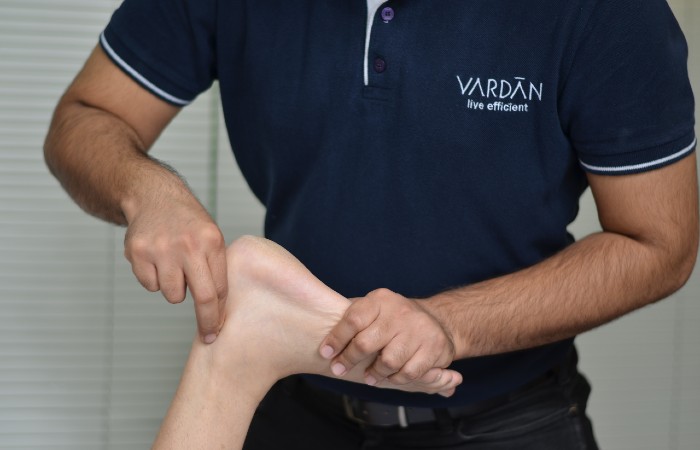 |
| Weight Training Injuries |
 |
|

By - Amanpreet Kaur
Functional Manual Therapist at VARDĀN
|
Weight training injuries are extreme, overload injuries to soft tissues, neural, and sometimes bony structures.
Weight training, as a sport or recreationally, can result in various injuries and tissue damage. Most commonly back, shoulders
and knees are affected.
The severity can vary from mild strain to severe dislocation. Most gym-related injuries are due to either
poor technique or failure to gradually increase loads.
|
|
|
| Common Causes |
|
- Lack of warmup before workout
- Over-training
- Lack of muscle-stretching
- Not attaining proper form while lifting
- Overloading weight limit
- Lack of core engagement
- Unstable working surface
- Not taking enough rest in between
|
|
|
| Common Weight Training Injuries |
| Back Injuries |
|
|
Back injuries are characterised by muscular strains, ligament sprains, and joint dysfunction, particularly when pain arises
suddenly during or following repetitive or unaccustomed physical loading of the spine.
Inefficient, weak, back muscles that lack endurance or normal contraction timing can lead to poor joint stabilisation and subsequent injury.
Discs, in particular, are at risk due to our pre-occupation with sitting. Many people head to the gym with their discs
already under strain from hours of constant sitting and poor posture. The disc can be further stressed through loading
and cause considerable pain and disability. In more severe circumstances, they can cause irritation of the lumbar nerve roots, resulting in sciatica.
|
|
|
| Ankle injuries: Achilles Tendonitis and Sprain |
|
|
Achilles tendonitis is another common injury for runners and is indicated as the pain in the back of heel.
Ankle sprains are seen as an injury to the ligaments of the ankle, following any twisting injury of the ankle, in weight-bearing positions.
|
|
|
| SLAP Tear |
|
|
A SLAP tear (which stands for Superior Labrum Anterior and Posterior) can occur
from both acute trauma and repetitive stress from motions like throwing or overhead lifting with
full rotation of arm, leading to the labrum tear and pain in shoulder with overhead activities.
|
|
|
| Shoulder Impingement |
|
|
Weight lifting overhead can sometimes irritate rotator cuff tendons under the acromion, is another common injury.
When this space is narrowed, it irritates the tendons. With progressive irritation, there is chronic inflammation
of tendons, which leads to pain and weakness in the shoulder joint.
|
|
|
| Knee Injuries |
|
|
It is a vulnerable joint to damage from weightlifting, particularly squats or any exercise which puts load on knee.
Sudden, jerking movements, executed without proper form, can easily tear the connective tissue in the knee, or stress
the joint affecting your balance and comfort.
|
|
|
| Neck And Spine Stress |
|
|
Sloppy form, overloading on your weight limit, or pushing yourself beyond the point of fatigue can
strain the neck, and sometimes cause severe injuries like disc bulge, acute muscle spasm, decreased blood flow to brain, or facet lock.
|
|
|
| Hernias |
|
|
One of the most common weightlifting injuries.
Lifting heavy weights with wrong form increases intra-abdominal pressure
causing the intestine to protrude out on the abdominal wall through the site of weakness.
|
|
|
| How To Avoid Injuries |
|
- Proper warm-up
- Stretching tight muscles
- Focusing more on core muscles
- Following progression
- Foam rolling on the areas of tightness
- Avoid workout when lethargic
- Weight lifting with right form
- Use proper gears: like shoes with good cushioning
- Check equipment first
- Find your training guide or someone qualified to guide you
|
|
|
| How FMTTM Helps |
 |
|
|
The unique aspect of FMTTM is the integration of the mobility treatment with neuromuscular facilitation, which is the ability
to initiate the right muscles at the right time with proper strength and endurance along with motor control.
FMTTM helps in teaching the patient to volitionally activate their core muscles during weight training, thus preventing injuries.
Muscles like tranversus abdominis, pelvic floor, multifidus, glutes, and diaphragm are considered as the major core muscles of the body.
FMTTM helps in activating these muscles through core-first strategies, thus incorporating them during daily activities as well.
With progressive training using FMTTM principles, an individual's proprioceptive awareness becomes more proficient, automatically
making him/her more aware of postures. This helps in adapting the right form while doing weight-training exercises.
This overall helps in preventing injuries.
|
|
|
 |
| |
Our Client Speak
I started my sessions with Amanpreet and she's been amazing from the start. She's been patient and understanding.
The FMTTM sessions have been really helpful and so has the exercises.
I've learnt so much about my own body,
my weak points and which muscles I have to work on! Overall these sessions have helped me a lot, I feel so much
better and stronger compared to my first day here. Amanpreet has also motivated me from the start and has pushed
me to keep building and strengthening my muscles.
Thank you Amanpreet. Keep up the good work!
- Chloe Albin
|
|
|
 |
| |
|

|
VARDĀN is open for consultation & treatment sessions. You can book an appointment with our Functional Manual Therapist to avail our services. We are following stringent precautionary measures for your safety. To contact, you may call or mail us.
|
|
|
| |
|
FOR MORE INFORMATION
Please call 011-43580720-22, 8:30 AM to 6:30 PM
Monday to Saturday
You may also contact our team on
+91-9971112446, +91-9910955500, +91-9810306730, +91-9910855500
Email: vardan@timesgroup.com | Web: www.vardan.in
Address: 16-A, Ring Road, Lajpat Nagar- IV, New Delhi 110024
A Functional Manual Therapist is also available in Gurugram & Noida
|
|
 |
|
|
|







